LONDON: Over the past year, the Syrian regime of Bashar Assad has been at pains to avoid direct involvement in Gaza and Lebanon, despite its informal alliance with Hamas and Hezbollah and professed support for their cause against Israel, not to mention the deadly Israeli strikes on Iranian military assets on Syrian territory.
Crippled by 13 years of civil war, international isolation, and economic weakness, this might seem a prudent move. Intervening in either conflict could invite a devastating retaliation from Israel and drag the country into a wider regional war.
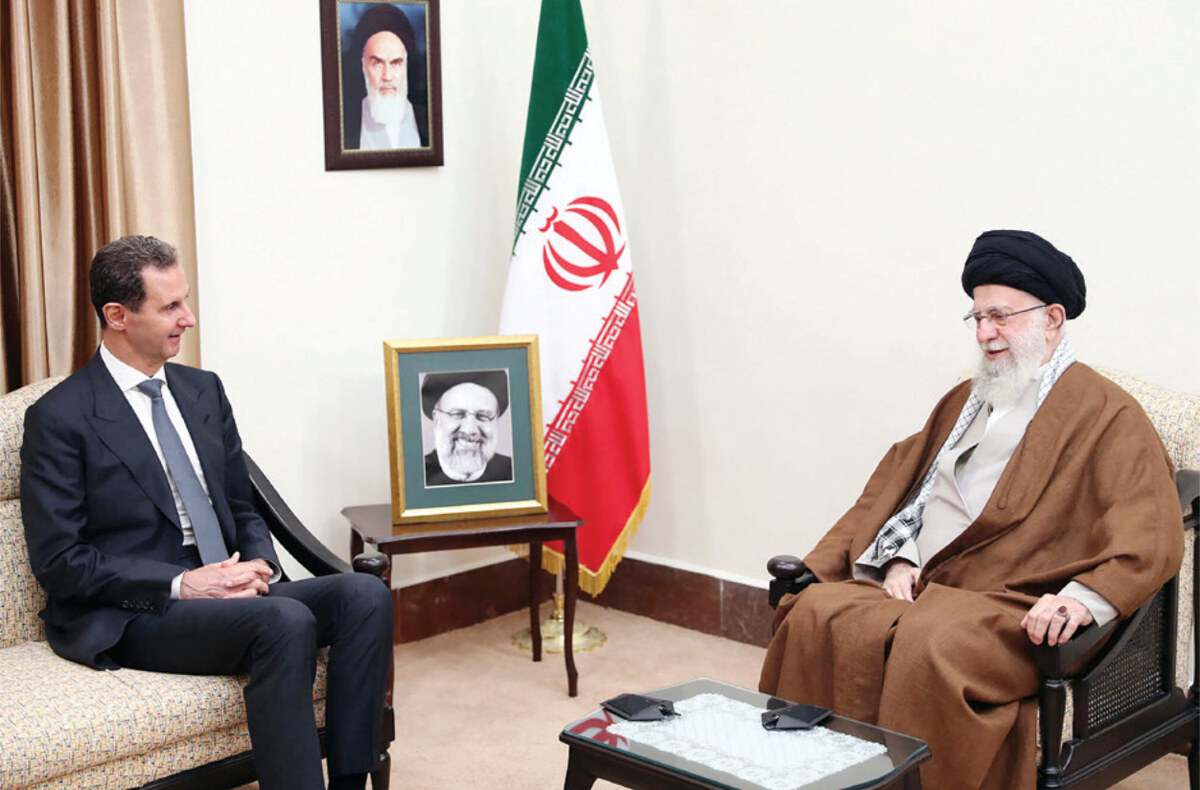
CaptionIran's Supreme Leader Ayatollah Ali Khamenei (R) meeting with Syria's President Bashar al-Assad in Tehran on May 30, 2024. ( KHAMENEI.IR / AFP)
However, Assad’s absence from the battlefield has raised questions about his role within the so-called Axis of Resistance — the loose network of Iran-backed Arab proxies that includes Hamas and Hezbollah — and, by extension, his reliability as an ally of the Islamic Republic.
Ever since Iran came to Assad’s rescue in 2011-12 when an armed uprising threatened his rule, Syria has effectively been a vassal of the Islamic Revolutionary Guard Corps, used as a land bridge to deliver weapons to Hezbollah, making it a favored target for the Israeli military.
The attacks have become more frequent since the wars in Gaza and along the Israel-Lebanon border erupted in October last year — the most significant being the April 1 strike on the Iranian Embassy annex in Damascus that killed multiple high-level IRGC commanders.

Assad’s ties with Iran and Hezbollah helped him win the Syrian civil war but have made his country a target for Israeli strikes. (AFP file photo)
“Israel has been striking alleged Hezbollah and Iran-linked targets in Syria for years, but the pace of Israeli strikes has increased since 2023,” Aron Lund, a fellow at Century International, told Arab News.
“With the war in Gaza and now also the invasion of Lebanon, Israel has adopted a much more aggressive posture against Syria. Israeli jets strike with regularity and impunity, and the Syrians are just soaking it up. They can’t do much to stop it and are probably afraid to try, for fear of further escalation.”
While Lund highlights Israel’s intensifying air campaign in Syria, Karam Shaar, a political economist and non-resident senior fellow at Newlines Institute, points to a deeper concern driving the Syrian regime’s inaction.

A handout picture released by the official Facebook page for the Syrian Presidency on October 22, 2019, shows Syrian President Bashar al-Assad consulting a military map with army officers in al-Habit on the southern edges of the Idlib province. (AFP)
He suggests that Assad’s reluctance to retaliate against these Israeli strikes stems from his regime’s vulnerability.
“It knows that the Israelis might actually just topple it altogether,” Shaar told Arab News. “All it needs is a nudge for it to just come down crashing.”
Although it has enjoyed years of Russian and Iranian support, the Syrian Arab Army is today a shadow of its former self — ground down by more than a decade of underinvestment and fighting with armed opposition groups.

A United Nations Truce Supervision Organization military observer uses binoculars near the border with Syria in the Israeli-occupied Golan Heights on May 11, 2018. (REUTERS/File Photo)
According to Randa Slim, director of the Conflict Resolution and Track II Dialogues Program at the Middle East Institute in Washington, D.C., Syria is in no position to withstand a major Israeli offensive.
“The Assad regime is weak and cannot afford to get entangled in another war at the moment,” she told Arab News. “His army is weak, with major parts of the country outside his control. His two principal allies, Russia and Iran, cannot come to his defense at this time in case Israel decides it is time to mount a major attack on Syria akin to what is taking place in Lebanon.”
Elaborating on the point, she said: “Moscow is entangled in a protracted war against Ukraine. Tehran has its own problems to contend with domestically and is facing a potential war with Israel and the US. Assad’s modus operandi for now is to avoid getting entangled in the Axis of Resistance war against Israel.”
FASTFACTS
• Hafez Assad established Alawite-minority rule in Sunni-majority Syria in 1971, serving as its president until his death in 2000.
• Bashar Assad succeeded his father but presides over a nation riven by civil war since the uprising against his rule began in 2011.
Some experts have suggested that in the case of Gaza, it is not just Syria’s military weakness that is likely preventing a meaningful contribution: Assad’s relationship with Hamas has been sour since 2011 when the Palestinian militant group sided with the Syrian uprising against his rule.
“The relationship between Hamas and the regime is bad and has been bad since 2011, since Hamas stood in support of the Syrian revolution,” Jihad Yazigi, editor in chief of The Syria Report, told Arab News.
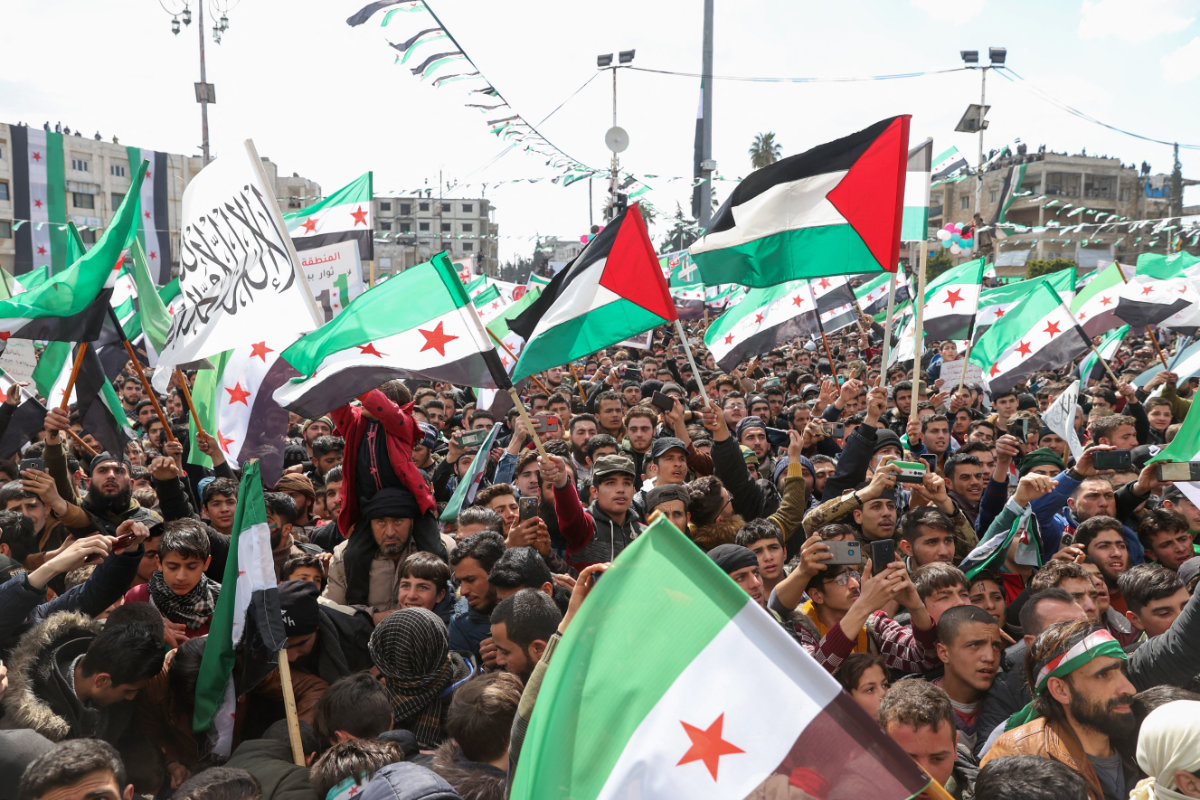
People wave Syrian opposition and Palestinian flags at a rally marking 11 years since the start of an anti-regime uprising in Syria's rebel enclave of Idlib on March 15, 2022. Thousands of protesters in Syria's rebel enclave of Idlib marked 11 years since an anti-government uprising, buoyed by the global outcry over Russia's invasion of Ukraine. (AFP)
In the case of Lebanon, the Syrian regime’s ability to project any kind of influence is a far cry from the days before 2011 when its forces exerted considerable control from within Lebanon itself.
“Remember that before 2005, it was the Syrian army that was in Lebanon,” said Yazigi. “From there, it had a say in Lebanese affairs and to an extent on Palestinian ones. Since 2011, it’s (Lebanon’s) Hezbollah that’s been on Syrian territory.”
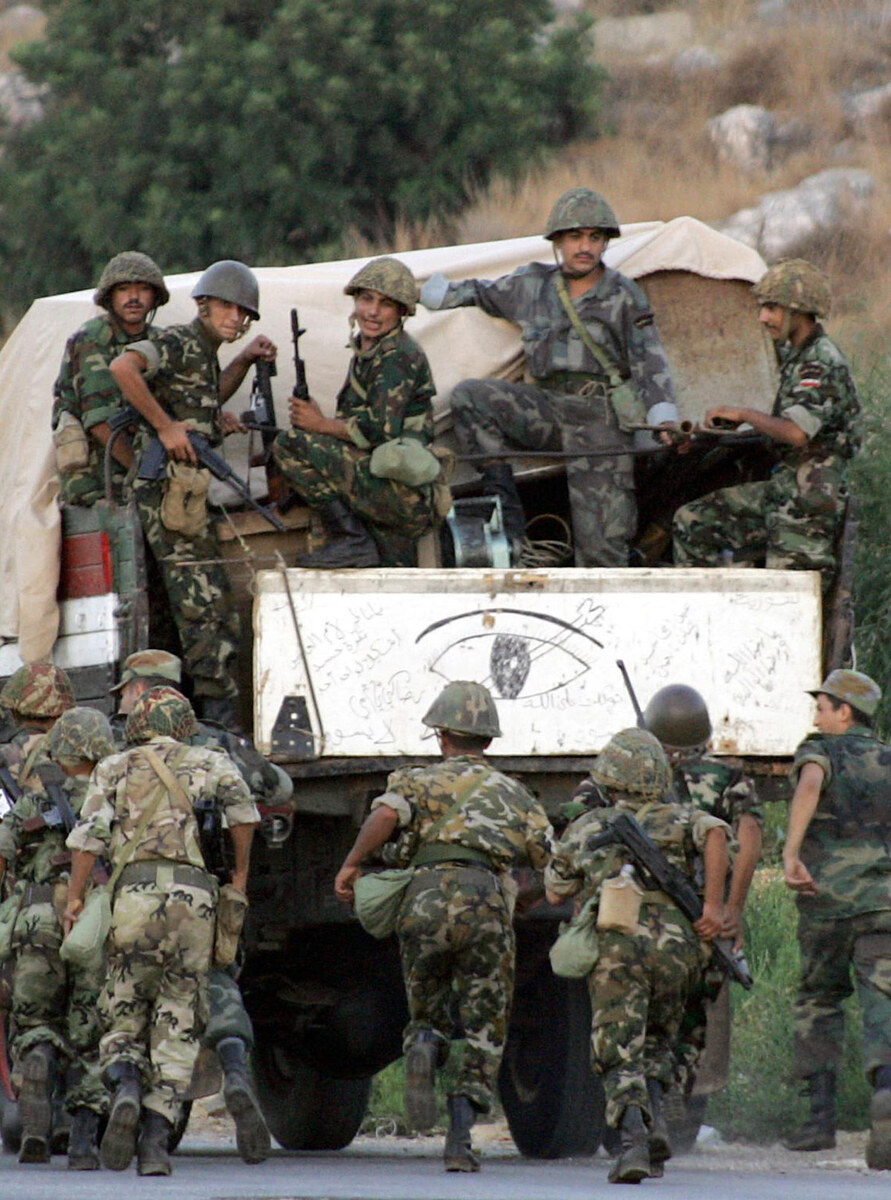
Syrian army troops evacuate their post in the southern Lebanese coastal town of Damur on September 22, 2004, amid international pressure for a full withdrawal and an end to Damascus's interference in Lebanese affairs. (AFP/file photo)
The consensus view of experts is that, far from playing the role of a regional kingmaker, Assad’s primary concern today is maintaining power. At the same time, just as he is reliant on Iran and Hezbollah to guarantee his survival, the IRGC and its proxies are also highly dependent on continued access to Syrian territory.
“Hezbollah has no other choice but Syria as far as their strategic depth is concerned,” said Slim.
“They need Assad’s acquiescence to maintain their Iranian weapons supply route through Syrian territory as well as to use some of the regime’s weapons production facilities in Syria to manufacture parts for their weapons.
“Given Israel’s unrelenting attacks on Hezbollah strongholds in Lebanon, Damascus is also the only place where Hezbollah and the IRGC can meet and coordinate their activities.”
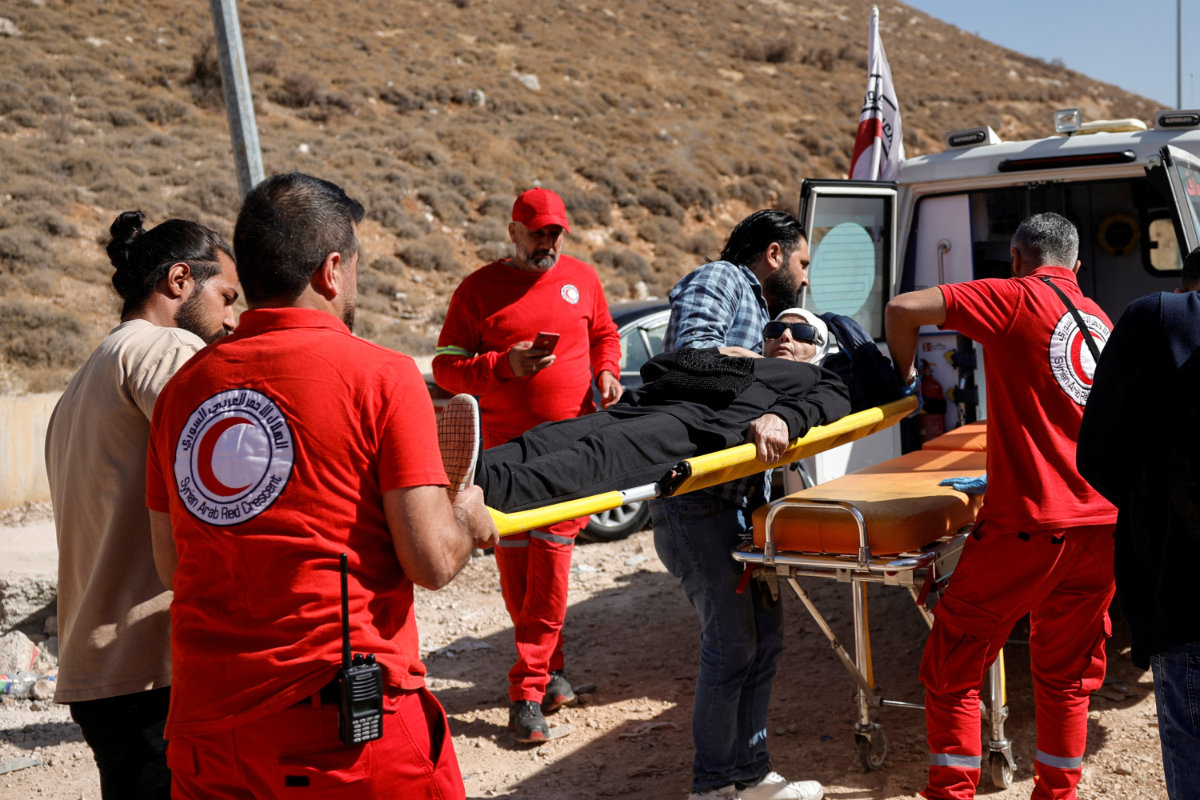
Members of the Syrian Arab Red Crescent carry a woman into ambulance on Oct. 14, 2024, as people fleeing Israeli strikes in Lebanon walk to Syria through the Masnaa border crossing. (REUTERS)
The secular Syrian regime’s relationship with Iran and its Shiite and Sunni proxies has long been described as a marriage of convenience, underpinned by overlapping interests rather than ideological affinity. Some think Assad may very well sell out his axis allies if a better offer comes along.
“Hezbollah has long realized that Assad is neither a dependable nor a trustworthy ally,” Slim told Arab News. “He has always toyed with the idea of striking an agreement with Israel. In 2006, in the midst of Israel’s war on Lebanon, he authorized an indirect communication channel with Tel Aviv.
“Despite their reservations about his loyalty, they sent men and weapons in support of the Assad regime in 2011-12 primarily because they could not afford to lose this ‘strategic depth’ if the Assad regime were to be replaced by an anti-Iranian, Sunni-majority government in Damascus.”
Although Syria’s role in Lebanese and Palestinian affairs has effectively shifted over the years from active participant to passive supporter, this does not mean the Assad regime has shirked responsibility altogether.

“Even in this weakened state and despite the risks, the Syrian government does seem to be providing support for Hezbollah,” said Lund of Century International.
“Damascus has allowed Hezbollah and Iran to train and equip themselves on Syrian territory, and Syrian state institutions offer medical care and other services to Hezbollah fighters.
“Many of the heavy rockets that Hezbollah recently began firing on Israel are Syrian in origin, although we don’t know when they were provided.”
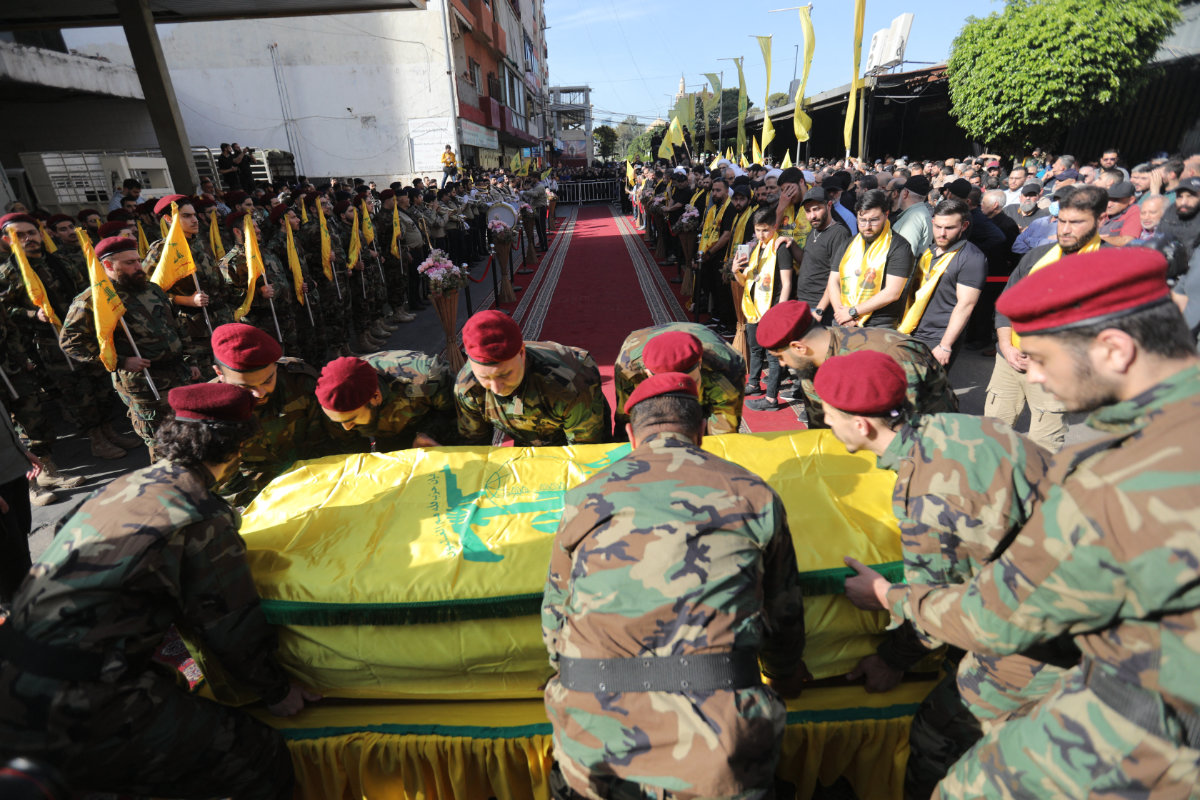
Hezbollah fighters carry the coffin of commander Ahmed Shehimi, who was killed in an Israeli raid in Syria early on March 29, during his funeral procession in southern Beirut, on April 1, 2024. (AFP)
Having been rescued by Iran and Hezbollah, Assad may have been expected by his benefactors to do far more to support his axis allies — at the very least as a sign of gratitude. It appears, however, that they recognized his limitations early on in the conflict.
Hassan Nasrallah, Hezbollah’s late secretary-general, said as much shortly before he was killed in an Israeli airstrike on Beirut on Sept. 27.
“It seems that Iran and Hezbollah have, so far, agreed on a more passive role for Syria,” Armenak Tokmajyan, a nonresident scholar at the Malcolm H. Kerr Carnegie Middle East Center, told Arab News.
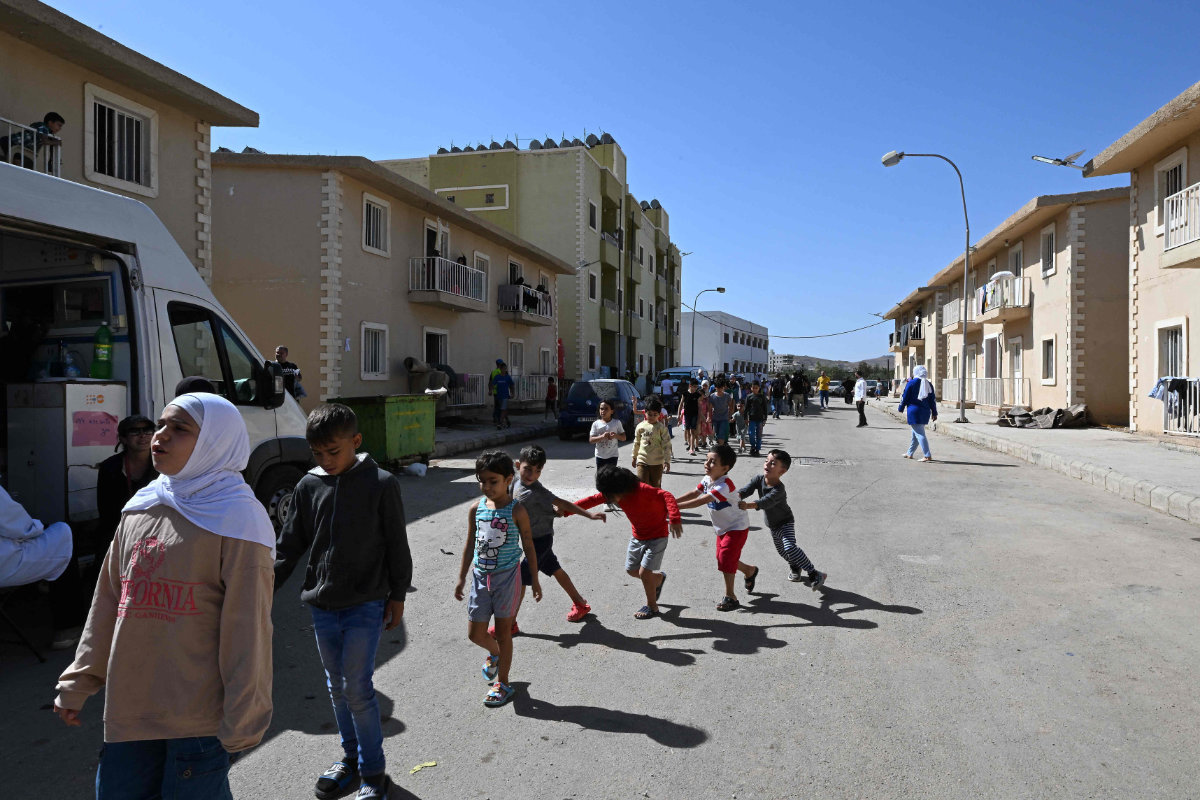
Lebanese civilians fleeing the war between Israel and Hezbollah in Lebanon are pictured at accommodations housing them in al-Harjalah, south of the Syrian capital Damascus, on October 15, 2024. (AFP)
“Just weeks before his death, Nasrallah said that ‘Syria is not required to enter the fighting because of its internal circumstances,’ adding that Syria should take on a supportive role.
“The pattern of Israeli strikes in Syria suggests that Syria is indeed playing this supportive role, such as allowing Hezbollah to store weapons on its territory.
“However, a more active involvement would likely attract unwanted Israeli attention, posing a significant risk to Assad’s regime.”
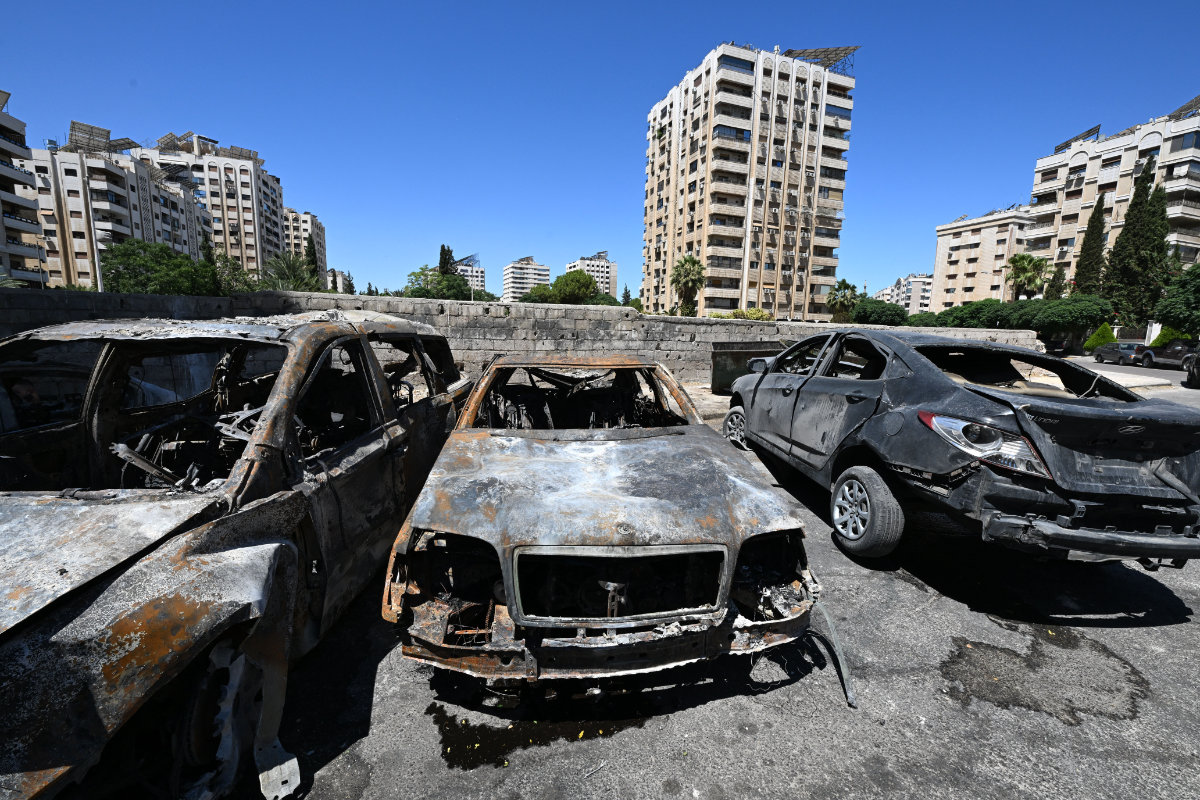
Charred cars lie in a parking lot in the aftermath of an Israeli strike in the neighborhood of Kafr Sousse in Damascus, early on July 14, 2024, in response to two drones launched towards Israel from Syrian territory. (AFP)
The expectation that he must feel eternally indebted to Iran and Hezbollah for rescuing his regime may also be an indignity too far for Assad, according to some analysts who also believe that Israeli pressure on his allies may offer just the opportunity he has been waiting for to extricate himself from Iran’s sphere of influence.
“Assad hopes that Iran and its militias will weaken after this war,” Bassam Barabandi, a former Syrian diplomat who defected from the regime in mid-2013, told Arab News, suggesting that Assad might already be quietly double-crossing the axis.
“He anticipates that Arab countries will reward him for his stance against Hezbollah and Iran by supporting the economy and reopening diplomatic channels to restore his relationships with the Arab and Western worlds.
“A significant question arises regarding how Iran would respond if it realizes that Assad has betrayed it.
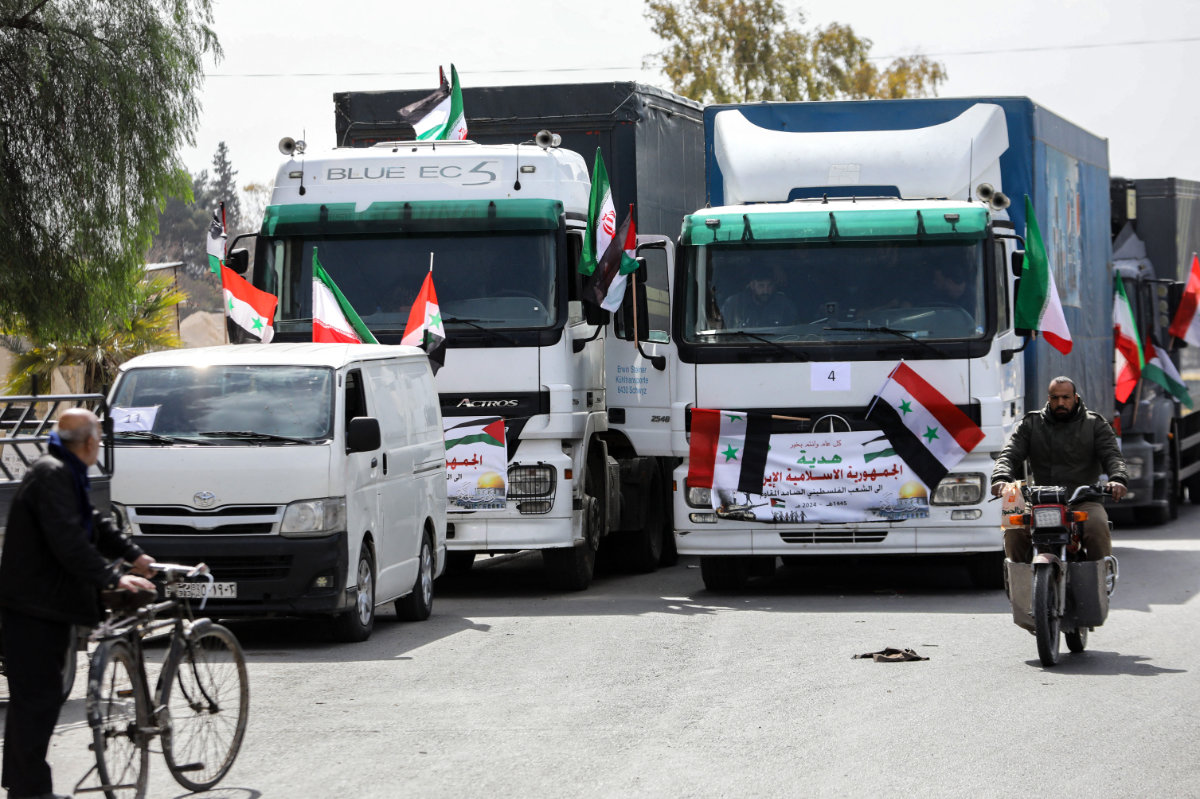
Trucks wait at the entrance of the Yarmuk camp for Palestinian refugees, south of Damascus, during a delivery of humanitarian aid provided by Iran on March 26, 2024. (AFP)
Although there is ongoing discussion about the possibility of Syria moving away from Iran and closer to the Arab states, Yazigi of The Syria Report believes the Assad dynasty’s ability to distance themselves from Tehran remains limited.
“The Iranian-Syrian relationship is very important. We don’t realize it enough,” he said.
“They have had ties since the late 1970s, early 1980s. Even before Hezbollah was created, you had a strategic alliance between Syria and Iran, which dates back to the Iran-Iraq war and the Islamic Revolution. So, it is not even clear how confident and how capable Bashar is to depart too much from the Iranians.
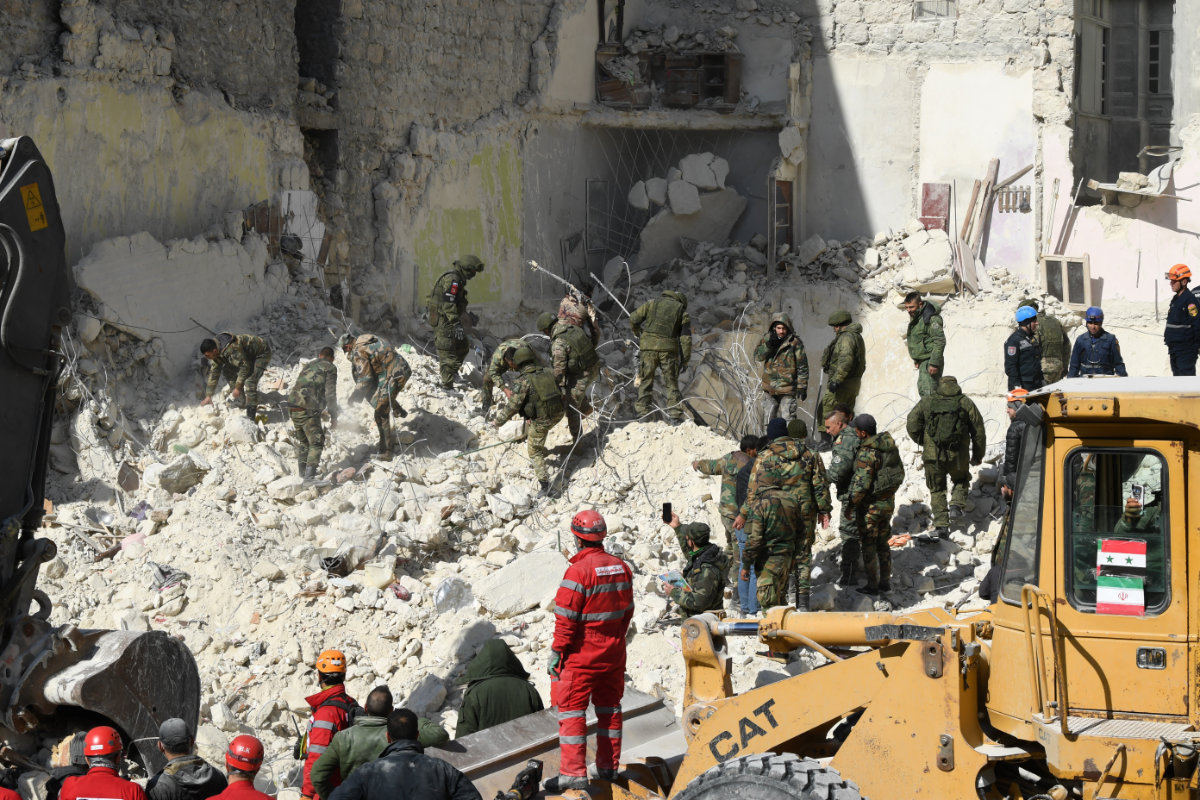
Iranian rescuers (red) and Syrian soldiers sift through the rubble of a collapsed building in the northern city of Aleppo, searching for victims and survivors days after a deadly earthquake hit Turkey and Syria, on February 9, 2023. (AFP)
“The other aspect is if you want to build back ties with the Arab regimes, departing from the Iranians is a good thing, it’s a starter, but it’s not enough. Assad has shown a lot of difficulties making the required concessions to gain more funding from the Arabs, to make a peace deal with the Turks.”
Despite Assad’s readmission to the Arab League in 2023, one sore point that has hindered progress on the restoration of trust and economic ties is his perceived failure to crack down on the production and smuggling of narcotics, particularly Captagon, which appears to have become a valuable source of income for the sanctions-squeezed regime.
Avoiding active involvement in Gaza and Lebanon may help preserve the Assad regime in the short term, but Syria’s dire economic situation remains an existential threat.
The arrival of hundreds of thousands of people displaced from Lebanon, the bulk of them Syrians who had previously fled the civil war in their own country, could also exacerbate Syria’s internal instability.
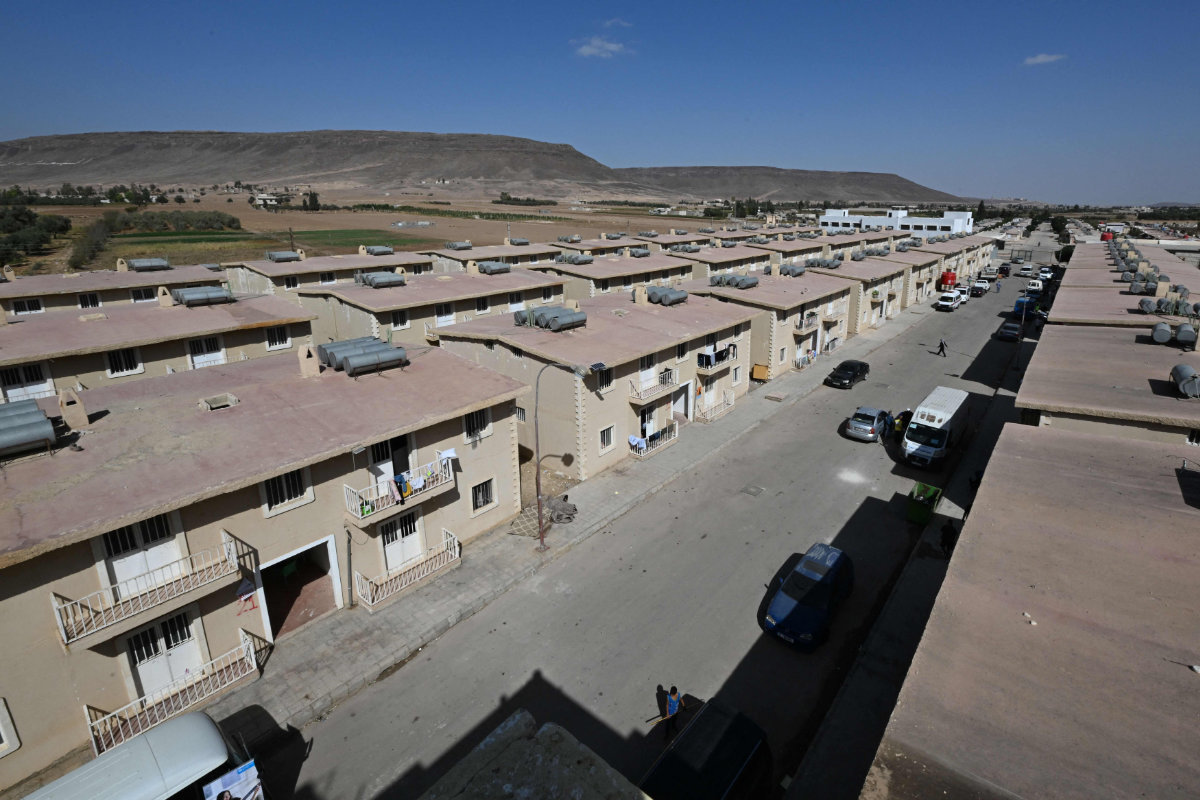
Syrian Red Crescent personnel assist Lebanese people fleeing the war between Israel and Hezbollah in Lebanon, at accommodations housing refugees in al-Harjalah, south of the Syrian capital Damascus, on October 15, 2024. (AFP)
Even though the majority are women and children, “Assad completely rejects the return of refugees, viewing them as his enemies from whom he wishes to distance himself,” Barabandi, the former Syrian diplomat, told Arab News.
For his part, Yazigi says that population movements have played a role in the past in destabilizing Syria, comparing the current situation to the wave of returnees from Lebanon following the killing of Lebanese Prime Minister Rafic Hariri in 2005.
“If the uprising began in 2011, it is due to many factors, one of them is the return of hundreds of thousands of Syrian workers from Lebanon after the assassination of Hariri and the withdrawal of the Syrian army,” he said.
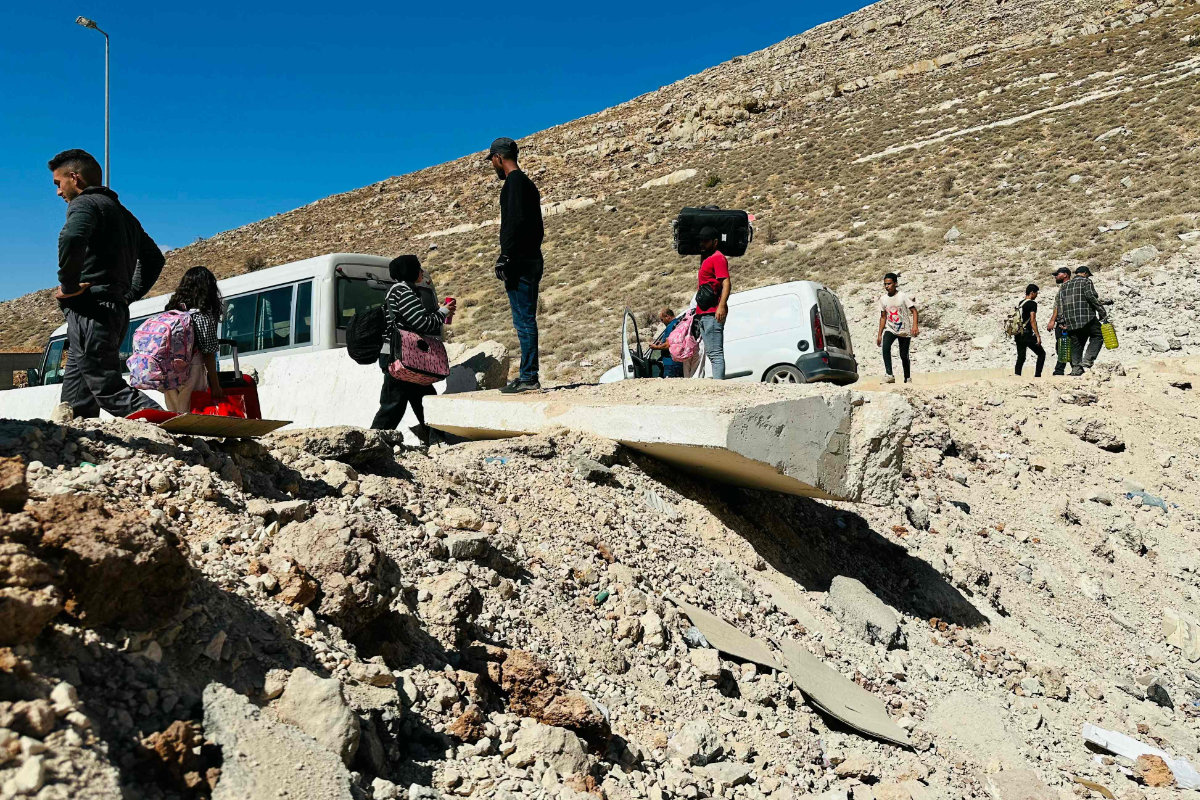
A volunteer with the Syrian Arab Red Crescent helps people fleeing Israeli bombardment in Lebanon as they walk across a crater caused by an Israeli strike, in the area of Masnaa on the Lebanese side of the border crossing with Syria, on October 15, 2024. (AFP)
“The Syrians faced a lot of anti-Syrian acts in Lebanon, which led to hundreds of thousands of people returning and staying in Syria without a job.
“Of course, the situation has completely changed since then. Everybody is exhausted, and nobody has in mind in Syria to do anything in the form of an uprising. But it is a (potential) factor of destabilization.”
Despite Assad’s passive support for the Axis of Resistance, some say keeping him in power in his enfeebled state likely serves Israeli and US interests far better than the alternative — regime change and all its associated chaos.
“To date, Israel has found Assad a reliable enemy,” said Slim. “They have him now at a position that serves their interests: a weak ruler over a divided and bankrupt country.”
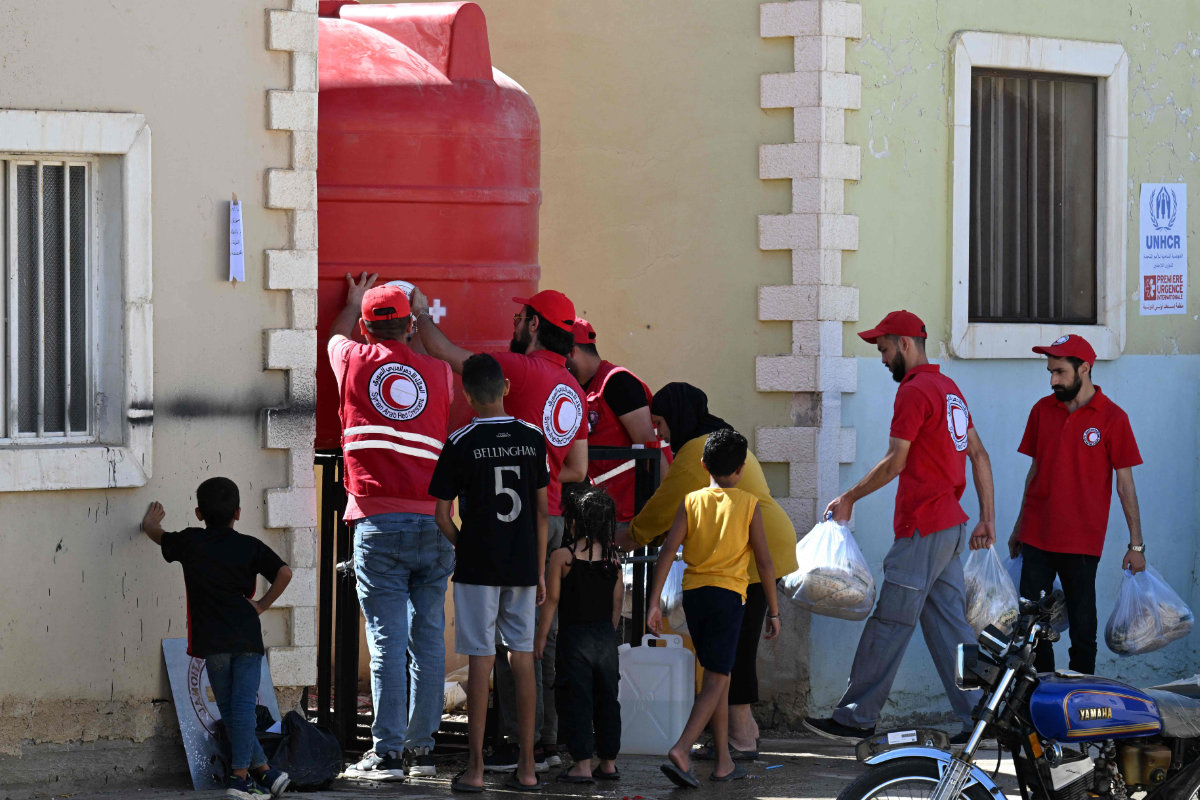
Syrian Red Crescent personnel assist Lebanese people fleeing the war between Israel and Hezbollah in Lebanon, at accommodations housing refugees in al-Harjalah, south of the Syrian capital Damascus, on October 15, 2024. (AFP)
Ultimately, Syria’s limited role in the ongoing regional turmoil reflects Assad’s delicate balancing act — caught between the competing demands of regional powers, economic weakness and the need to preserve his own regime.
“There’s no doubt that Assad is grappling with multiple challenges on various fronts,” said Tokmajyan.
“A displacement crisis that brings social and economic pressures at home, while also reducing remittances from Lebanon; the loss of an important economic lifeline in Lebanon; an ally in Hezbollah, whose capabilities are being eroded; the risk of being dragged into a war.
“All of this comes on top of Syria’s existing economic troubles. But will this lead to a revolt or the regime’s collapse? It’s hard to say. Assad has proven to be resilient so far.”


































